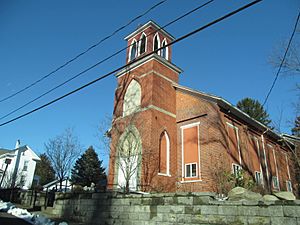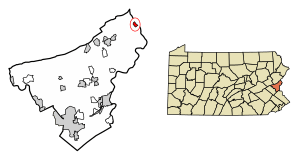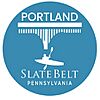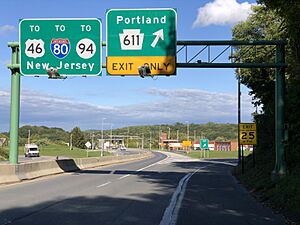Portland, Pennsylvania facts for kids
Quick facts for kids
Borough of Portland
|
||
|---|---|---|

A church in Portland, January 2013
|
||
|
||

Location of Portland in Northampton County, Pennsylvania (left) and of Northampton County in Pennsylvania (right)
|
||
| Country | ||
| State | ||
| County | Northampton | |
| Area | ||
| • City | 0.56 sq mi (1.44 km2) | |
| • Land | 0.48 sq mi (1.25 km2) | |
| • Water | 0.07 sq mi (0.19 km2) | |
| Elevation | 335 ft (102 m) | |
| Population
(2020)
|
||
| • City | 494 | |
| • Density | 1,022.77/sq mi (395.25/km2) | |
| • Metro | 865,310 (US: 68th) | |
| Time zone | UTC-5 (EST) | |
| • Summer (DST) | UTC-4 (EDT) | |
| ZIP Code |
18351
|
|
| Area code(s) | 570 | |
| FIPS code | 42-62264 | |
| Primary airport | Lehigh Valley International Airport | |
| Major hospital | Lehigh Valley Hospital–Cedar Crest | |
| School district | Bangor Area | |
Portland is a small town, called a borough, located in Northampton County, Pennsylvania. In 2020, about 494 people lived there. Portland is part of the larger Lehigh Valley area. This area is home to over 860,000 people.
Contents
Geography of Portland
Portland is found at coordinates 40.920622 degrees north and -75.097738 degrees west. The borough covers about 0.6 square miles (1.6 square kilometers). Most of this area is land, about 0.5 square miles (1.3 square kilometers).
A small part, about 0.1 square miles (0.26 square kilometers), is water. This is because Portland is located right along the Delaware River. The river adds to the borough's unique geography.
Getting Around Portland
Portland has several roads that help people travel. As of 2007, there were about 4.27 miles (6.87 kilometers) of public roads. Some roads are kept up by the state, and others by the borough itself.
The main highway serving Portland is Pennsylvania Route 611. It runs north and south through the town. The Portland–Columbia Toll Bridge is an important bridge here. It crosses the Delaware River, connecting Portland to New Jersey. This bridge links Portland to major roads like U.S. Route 46 and Interstate 80.
Portland also has a special pedestrian bridge. This bridge lets people walk across the Delaware River to Columbia, New Jersey. It is 770 feet (235 meters) long. This bridge is the last of its kind that used to cross the Delaware River. Before a big flood in 1955, it was a covered bridge.
History of Portland
Early Days and Growth
In its early days, Portland's main business was logging, which means cutting down trees for wood. The town also had many places for travelers to stay, like taverns and hotels. These places were popular with the loggers.
The arrival of the railroad was a big deal for Portland. It changed how goods were moved and brought many new people to the area. As more people moved in, new businesses opened up. These included general stores, a hardware store, and even a jewelry store.
Over the last 100 years, Portland's population has stayed fairly steady. The businesses in town mostly serve the people who live there. Many of these businesses are owned by people from Portland or nearby towns. This gives them a special connection to the community.
The Delaware River and Bridges
The Delaware River was always important for transportation. First, Native Americans used canoes on the river. Later, people used rafts to float goods, especially during spring floods. Even in the 1870s, the river near Portland would be filled with rafts. Rafting became less common in the 1880s because railroads could move lumber faster.
The idea for the Portland Covered Bridge started in 1816. A man named Francis Myerhoff wanted to build a bridge to help get sand for his glass factory in New Jersey. The bridge was finally finished in 1869. It was 775 feet (236 meters) long and 18 feet (5.5 meters) wide. It cost about $40,000 to build.
Newspaper and Bank
Portland used to have its own weekly newspaper called The Portland Enterprise. It started in 1874 and shared news with people on both sides of the river. The town also had the Portland National Bank, which opened in 1903. It helped the community with money matters, except for a short time during the Great Depression in 1932.
The Great Flood of 1955
A huge flood on August 19, 1955, caused a lot of damage. The water in the Delaware River was the highest ever recorded. The middle part of the Portland Covered Bridge broke apart and floated down the river. This was the end of what was then the longest covered wooden bridge in the United States. It was also the last covered bridge crossing the Delaware River.
In 1988, County Bridge No. 36 in Portland was added to the National Register of Historic Places. This means it's an important historical site.
Population in Portland
| Historical population | |||
|---|---|---|---|
| Census | Pop. | %± | |
| 1880 | 608 | — | |
| 1890 | 676 | 11.2% | |
| 1900 | 490 | −27.5% | |
| 1910 | 649 | 32.4% | |
| 1920 | 545 | −16.0% | |
| 1930 | 551 | 1.1% | |
| 1940 | 427 | −22.5% | |
| 1950 | 551 | 29.0% | |
| 1960 | 589 | 6.9% | |
| 1970 | 612 | 3.9% | |
| 1980 | 540 | −11.8% | |
| 1990 | 516 | −4.4% | |
| 2000 | 579 | 12.2% | |
| 2010 | 519 | −10.4% | |
| 2020 | 494 | −4.8% | |
| Sources: | |||
In 2000, there were 579 people living in Portland. These people lived in 236 households. Most of the people living in Portland were White. A small percentage were Asian or from other backgrounds. About 4% of the population identified as Hispanic or Latino.
Many households were married couples living together. Some households had children under 18. The average household had about 2.45 people. The average family had about 2.99 people.
Education in Portland
Students in Portland attend schools in the Bangor Area School District. Older students, from ninth to twelfth grade, go to Bangor Area High School in Bangor.
Images for kids
See also
 In Spanish: Portland (Pensilvania) para niños
In Spanish: Portland (Pensilvania) para niños









